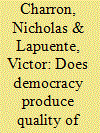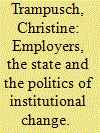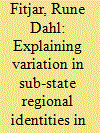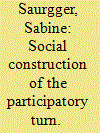|
|
|
Sort Order |
|
|
|
Items / Page
|
|
|
|
|
|
|
| Srl | Item |
| 1 |
ID:
094984


|
|
|
|
|
| Publication |
2010.
|
| Summary/Abstract |
This article analyses the effects of political regimes over state capacity or the quality of government (QoG): Do democratic states perform better than authoritarian ones? Previous studies point to a nonlinear relationship between democracy and government quality. It is argued here that QoG is a function of both forces of supply (leaders who have the power to make reforms) and demand (citizens' desire for mid- to long-term investments over short-term needs), the latter of which is a function of economic development. In democratic states, leaders have stronger incentives to improve QoG after a certain degree of wealth is reached, while in poorer countries they have little incentive for long-term bureaucratic investments. Thus it is predicted that the relationship between democracy and QoG is conditional, based on economic development. With over 125 countries in the sample, this hypothesis is tested using time-series panel data and spatial models, and strong empirical support is found.
|
|
|
|
|
|
|
|
|
|
|
|
|
|
|
|
| 2 |
ID:
094988


|
|
|
|
|
| Publication |
2010.
|
| Summary/Abstract |
An in-depth comparison of Austria, Germany and Switzerland shows that the employers' constellation and the elites of the public education administration affect patterns of institutional change. If large firms are the dominant actors and collaborate with elites in the public education administration, institutional change follows a transformative pattern. If small and medium-sized firms are in a strong position and have the power to influence public elites according to their interests, self-preserving institutional change results. The article also shows that it is not so much trade unions as small and medium-sized firms that act as a brake on transformative change. The article adds to the literature of institutional change by arguing that specifying and explaining patterns of institutional change requires that sufficient scope be allowed for actors' creative handling of institutions. It also suggests that in order to differentiate between self-preserving and transformative change, one has to specify the important institutional dimensions that sustain an institution. The article combines Mill's method of agreement and difference.
|
|
|
|
|
|
|
|
|
|
|
|
|
|
|
|
| 3 |
ID:
094987


|
|
|
|
|
| Publication |
2010.
|
| Summary/Abstract |
While national identities emerged as the dominant source of territorial identification during the twentieth century, sub-state regional identities are becoming increasingly important in some Western European regions. However, this is not a uniform development. In some regions, nearly half of respondents in Eurobarometer surveys claim a stronger attachment to the region than to the state. In others, less than 4 per cent are primarily attached to their region. This article examines the extent to which these differences are explained by the characteristics of the regions themselves. What, if anything, do regions that mobilise public identity have in common? Developing a model of regional identities, the study examines cultural, geographic, economic and political factors that vary across different regions in Western Europe. The study finds that regional identities tend to be stronger in regions where a regional language is spoken and which do not border the state capital, signalling a cultural and a centre/periphery dimension to regional identity formation. However, there is potentially a more strategic aspect to identification, as regional identities are likely to be stronger in economically developed regions and in regions with highly distinctive voting behaviour.
|
|
|
|
|
|
|
|
|
|
|
|
|
|
|
|
| 4 |
ID:
094986


|
|
|
|
|
| Publication |
2010.
|
| Summary/Abstract |
This article analyses how political parties frame European integration, and gauges the consistency of their argumentation. Over the course of investigation, one can see how actors' positions are justified, and how the European Union is perceived (i.e., what forces give rise to Euroscepticism and Europeanism). It is argued here that the parties' framing of issues depends on the interests they traditionally defend at the national level, their general positions on European integration, and whether or not they belong to the established political actors in their respective countries. The coding approach enables the relation of frames to actors and positions, moving beyond the techniques employed by existing studies that analyse the media presentation of European integration. Sophisticated frame categorisations are provided to capture the complex structure of argumentation, going beyond a simple dichotomy of economic and cultural frames. Relying on a large and original media dataset covering the period 2004-2006, six Western European countries are investigated.
|
|
|
|
|
|
|
|
|
|
|
|
|
|
|
|
| 5 |
ID:
094985


|
|
|
|
|
| Publication |
2010.
|
| Summary/Abstract |
At the beginning of the 1990s a new discourse emerged at the European Union level, insisting on the necessity of 'civil society' participation in decision-making processes. Based on a 'strategic-constructivist' research design, this article addresses the question of the emergence of this participatory turn in the official discourse and its transformation into a norm. It argues that the continued activism of an elite forum, consisting of political and administrative actors as well as academics, created the momentum that brought the concerned actors to accept the participatory norm and to play the roles required by it. However, due to internal competition amongst norm entrepreneurs, and a changed political situation, this norm is still contested, making it difficult to assess how its implementation will function.
|
|
|
|
|
|
|
|
|
|
|
|
|
|
|
|
|
|
|
|
|